|
"Be sure to lay wide streets planted with shady trees,
every other of a quick growing variety. Be sure that there is plenty
of space for lawns and gardens. Reserve large areas for football,
hockey and parks. Earmark areas for Hindu temples, Mohammedan mosques
and Christian churches."
Jamsetji Nusserwanji Tata on the formation of Jamshedpur.
It's
the new kid on the Tata block. Actually, it's been around for a
long time-a hundred years almost-but it was only on August 25, 2003,
that it came out of its mother's womb as an independent entity.
The umbilical cord is still in place, and it will still be some
time before it breaks totally free.
Just in case you're wondering what we're talking
about, it's JUSCO (Jamshedpur Utility and Services Company), which,
till a few months ago, was Tata Steel's town planning and management
services division and is now a 100 per cent subsidiary of the steel
company. "Tata Steel has been managing Jamshedpur since 1907
and has had as much experience in civic management as in making
steel, but had not leveraged this competency for commercial gains,"
says Sanjiv Paul, Managing Director of JUSCO, and the man charged
with turning an erstwhile cost centre of the steel behemoth into
a profit centre in its own right.
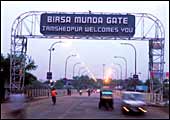 |
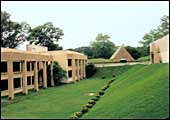 |
 |
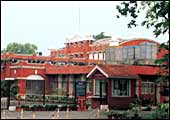 |
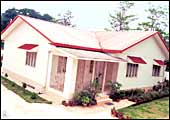 |
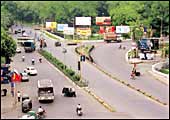 |
| End
of Utopia: Everything from water and education
to road and hospital has been, or will be privatised in the
township |
So what changed? And why is an old dog having
to learn new tricks to survive? "We believe that there's a
huge opportunity for the private sector in managing public utilities
like power, water and civic amenities. Power is already a big play
nationally. Water and civic amenities are the next big opportunities.
And if you throw in our expertise in town planning, construction,
education, healthcare, horticulture management and vector control,
we're the only company in the country that can offer integrated
civic management services on a turnkey basis," Paul says. "We
want to position ourselves to take advantage of any opportunities
that might emerge in this sector."
| STEEL CITY GETS STEEL HOUSES |
 |
| Safe as steel: JUSCO's architectural
head J. Singh in front of his house |
A house made of steel? what's new
about it, one might ask. Well, lots, actually. For one, it doesn't
use a single brick in its construction. There's no wood either.
The entire structure is built of special trapezoidal steel sheets
with thermocol insulation and cement fibre board cladding on
the outside. "It's much lighter than conventional brick
and mortar construction per unit of area," says Jatinder
Singh, Head (Architecture, Planning, Engineering and Construction),
JUSCO, who designed two steel houses and lives in one of them.
The doors, windows and wardrobes are also made of steel sheets.
The technology for these houses has been provided by Minaean
Building Solutions Inc. of Canada. "We feel this material
will revolutionise the construction industry and totally change
its dynamics in future," adds Singh. Only the plinth area
is made of conventional concrete, but since the superstructure
is much lighter than brick and mortar construction, the foundation
needs less of materials and is, therefore, cheaper. Ease of
construction is another huge plus: it takes only three months
to construct such a house as opposed to 9-12 months for a conventional
house. The panels are made off-site and are pieced together
on-site like pre-fab houses. Since it doesn't require any mixing,
like cement and concrete, the entire process is dry, non-messy
and eco-friendly. Besides, it costs the same as compared to
houses built of conventional materials. "The thermocol
insulation ensures that the house is 3 degrees cooler in summer
and 3 degrees warmer in winter," says Singh. The technology
can support houses up to four floors high. "The best part
is that these houses are resistant to earthquakes measuring
up to 7-plus on the Richter scale," Singh points out. |
Also, Tata Steel was spending upwards of Rs
100 crore a year on providing these services-even during the dark
days of the late nineties and early 2000s when its P&L account
had large blotches of red. "The top Tata management spent considerable
time pondering over the issue. Such a huge expenditure was clearly
weighing down Tata Steel's balance sheet, especially as competitors
had no such crosses to bear. At the same time, the Tatas had nurtured
Jamshedpur for close to a century and it was almost like a covenant
between the town and the group," says Sanjay Choudhry, Head
(Corporate Communications), Tata Steel. "And that's how JUSCO
was born; as a means of reducing the burden on Tata Steel's books
while at the same time continuing to provide the services we've
always provided in a financially viable manner."
But that doesn't mean that the Tatas are abandoning
the residents of Jamshedpur. Tata Steel will continue to subsidise
the operations of its newborn till it learns to stand on its own
feet. The process involves having to develop a market orientation.
Not an easy task for an organisation that has provided free services
for all of its nearly 100 years of existence. "We're going
through a learning process," says Paul, "and we have to
develop a business acumen." "It's a cultural transition
that we have to go through before we emerge as a full fledged market-oriented
organisation," adds Dhananjay Mishra, Chief (Integrated Customer
Services). "We now have to bill customers for services provided
by the 10th of every month. That's quite a change from times in
the recent past when billing was done once a year."
JUSCO is also bidding for contracts to manage
townships owned by other companies both within and outside the Tata
Group. It has already taken over the Indian Steel Wire Products
(ISWP) township in Jamshedpur and will soon take over the operations
of the Tinplate, TRF and Tata Motors townships and the local National
Institute of Technology colony. It is also in talks with ONGC to
manage one of its townships in Assam. Projected turnover for the
first year is about Rs 100 crore, but the company is aiming high.
"Construction, power and water will be the vehicles of growth,"
says Paul. In this context, he informs that JUSCO has recently entered
into a contract with Minaean Building Solutions Inc. of Canada to
develop steel housing (see Steel City Gets Steel Houses). This technology
has the potential of revolutionising the construction scene in the
country and can catapult Tata Steel's fledgling offspring into the
upper reaches of the group's pecking order.
 |
"We're the only company in India
that can offer integrated civic management services on a turnkey
basis"
Sanjiv Paul
MD/JUSCO |
The company has bid for a Rs 4,000-crore-plus
Jharkhand government contract to provide mass housing. If it wins
the six-year deal, turnover will immediately leapfrog six to seven
times at one go. JUSCO also sees itself as the national water company
of the future even though electricity is its cash cow now. The projections
for the first year are profitable but the company will have to spend
money creating new infrastructure, which will bring down its book
profits. "There's fantastic scope for growth in this business,"
says Ruchi Narendran, former marketing pro at Tata Tea, and independent
consultant retained by JUSCO to help it formulate a marketing strategy.
"Right now, we deal with Tata Steel and other corporate customers
on a b2b basis. But we will definitely enter the b2c segment in
future," she says.
But before that happens, Paul is looking to
beef up his balance sheet and improve his bench strength. "We
have to recruit quality people and bring them into the Tata culture.
That takes time and can be a bit of a struggle at times but that's
the challenge we have to face," says Paul. He's quite bullish
about the future, though. And he's confident that a year-and-a-half
down the line, he can apply for the Group Composite Mark (GCM),
the distinctive Tata logo that most of the big group companies sport.
"Group companies can't lay claim on the Tata logo as a matter
of right," explains Tata Steel's Choudhry, "it has to
be earned and companies have to attain a minimum size, run a business
of consequence and also satisfy stringent business excellence parameters
before applying for the GCM."
If that happens, as everyone in JUSCO is confident
it will, then Paul can bask in the satisfaction of having taught
a really old dog some pretty smart tricks.
TOWNSHIP SERVICES
JUSCO manages a range of services
that, often, are better than what is available elsewhere in
the country. |
| POWER: JUSCO has
a total of 40,000 industrial, commercial and domestic customers
and manages power purchase, sales and supply across all civic
and industrial utilities. Power consumption in Jamshedpur, at
650 KWH/person/year, is way above the national average of 450
kwh/person/year and is growing at 4-5 per cent per annum. The
company claims that power availability, at 99.42 per cent, is
better than the best in business: BSEB in Mumbai, which is 99.40
per cent. According to Ritu Raj Singh, who is in charge of strategy
at JUSCO, T&D losses are low at 10 per cent. "The Electricity
Act, 2003, allows two power suppliers to co-exist in one area.
This will allow us to grow in areas which have an existing distributor,"
he says.
WATER: JUSCO has tied up with
Veolia, a $14-billion global water management company, to
adopt international best practices in its operations. The
company provides raw water, clarified water, potable water,
industrial water and treated effluent management services
to 33,000 customers, of which about 20,000 are Tata Steel
employees. With a distribution network of 550 km and infrastructure
that includes seven water towers, the company supplies 55
million gallons of water per day. That's 250 litres of water
per head per day. "We've bought the best laboratory analysis
equipment and field test kits to maintain our quality standards,"
says David J. Turton, Operations Director (Jamshedpur), Veolia
Water India. The water business is not yet profitable, though.
The company spends Rs 4/cubic metre of water but recovers
only Re 1/cubic metre.
CONSTRUCTION AND FACILITIES MANAGEMENT:
JUSCO, in its previous avatar as Tata Steel's town
management division, has practically built Jamshedpur town
from scratch-apartments, bungalows, hostels, schools, hospitals,
roads and public utilities. "We look after 22,000 housing
units in the city, ranging from the Tata Steel MD's bungalow
to workers' quarters," says Dhananjay Mishra, Chief (Integrated
Customer Services), JUSCO. Jamshedpur town has been divided
into eight centres of 3,000-4,000 units, each of which has
been further sub-divided into zones. Each centre is headed
by a co-ordinator who works closely with independent contractors
to address construction-related problems. The company is in
the process of setting up a single-window complaints cell.
PUBLIC HEALTH AND HORTICULTURE SERVICES:
JUSCO caters to the needs of about 7 lakh residents
of Jamshedpur in handling the management and disposal of municipal
solid waste and bio-medical waste. Says Dr. Anil Kumar, who
heads the department: "This is an area that suffers from
a mosquito menace. But we haven't reported a single case of
malaria or dengue in areas managed by us," he says. The
company also handles immunisation, runs an integrated vector
control programme, provides training in areas of public health
and maintains the city's green cover and its parks.
EDUCATION: JUSCO runs nine schools
in Jamshedpur with more than 5,000 students. And CEO Sanjiv
Paul has big plans in this area. "Providing quality education
at an affordable price is a mission for us, not a business
opportunity," he says. The JUSCO chief is unwilling to
reveal details, though. "We're in the process of creating
a model, which we feel can become the blueprint for educational
institutions in future. But I don't want to discuss it till
we firm things up," he says.
|
|
